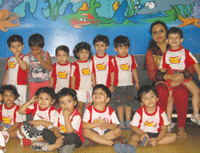 The only privately-promoted institutions of learning within the entire spectrum of Indian education which are not subject to the unwelcome attentions of the notoriously ill-qualified and venal education bureaucrats (educrats) and inspectors of India’s 29 state governments, seven Union territories and/or 6,795 municipal administrations, are the country’s estimated 150,000 private pre-schools. In popular societal and government estimation, early childhood education (ECE)/pre-school learning is synonymous with academically insignificant early childhood play. Awareness about recent research studies which indicate that 70 percent of brain development in children is completed within the first three years of life, will be a long time coming to Indian officialdom.
The only privately-promoted institutions of learning within the entire spectrum of Indian education which are not subject to the unwelcome attentions of the notoriously ill-qualified and venal education bureaucrats (educrats) and inspectors of India’s 29 state governments, seven Union territories and/or 6,795 municipal administrations, are the country’s estimated 150,000 private pre-schools. In popular societal and government estimation, early childhood education (ECE)/pre-school learning is synonymous with academically insignificant early childhood play. Awareness about recent research studies which indicate that 70 percent of brain development in children is completed within the first three years of life, will be a long time coming to Indian officialdom.
Official disregard for ECE is evidenced by the measly provision of Rs.6,706 crore made in the Union Budget 2009-10 for the government’s nationwide Integrated Child Deve-lopment Scheme (ICDS) programme. This meagre amount is spread over 1.3 million austere anganwadis (crèches) grudgingly set up to provide early childhood nutrition, immunisation, referral services and pre-school and non-formal education to the country’s 110 million children under five years of age.
Unsurprisingly, India’s newly emergent middle and upper classes prefer to keep their children far away from ICDS anganwadis which are essentially supplementary nutrition centres for the children of BPL (below poverty line) households. Instead, in response to the growing phenomenon of two income families and rising awareness of the vital importance of ECE, urban middle class households are increasingly enroling their progeny in professionally-managed pre-schools mushrooming across the country. Hitherto established in backyard gardens, garages and spare rooms of enterprising households to prepare tiny tots for the admission tests of elite metropolitan day schools, since the dawn of the new millennium, pre-schools have become increasingly professional and latterly have been rolled out countrywide under the franchise model.
Freedom from government controls and supervision has prompted the entry of several heavyweight corporates and entrepreneurs into pre-school education, mainly under the franchise model. Among them: Kidzee (700 pre-schools countrywide); EuroKids (600); I Play I Learn (75) and Kangaroo Kids (34). Moreover recently several specialised education companies such as iDiscoveri, Neev Schools and Educomp Solutions have ventured into pre-school education by promoting high-quality, globally bench-marked, owned (as opposed to franchised) pre-schools even as several offshore ECE majors such as the Singapore-based Know-ledge Universe are poised to enter the country’s huge and under-served pre-school educa-tion sector. According to the oft-quoted study of the Hong-Kong based market research and brokerage firm CLSA-Asia Pacific, the annual revenue currently generated by India’s pre-schools is estimated at $1 billion (Rs.4,500 crore), is growing at 28.3 percent per year and is expected to exceed Rs.15,000 crore in 2012.
Therefore for educationists and edupreneurs anxious to be spared government red tape, the pre-school segment offers excellent investment opportunity. Likewise for genuine philanthropists, there’s a great opportunity to establish superior anganwadis in rural India, where a shocking 46 percent of children under five years of age suffer severe malnutrition and early childhood education deprivation.